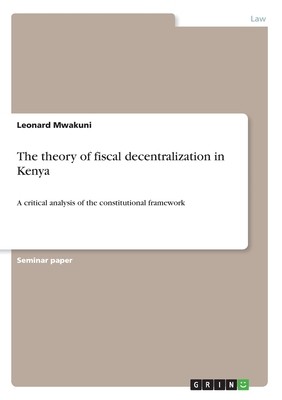
- We will send in 10–14 business days.
- Author: Leonard Mwakuni
- Publisher: GRIN Verlag
- Year: 2020
- Pages: 28
- ISBN-10: 3346216179
- ISBN-13: 9783346216175
- Format: 14.8 x 21 x 0.2 cm, softcover
- Language: English
- SAVE -10% with code: EXTRA
Reviews
Description
Seminar paper from the year 2019 in the subject Law - Public Law / Constitutional Law / Basic Rights, language: English, abstract: This work critically analyses this theory of fiscal decentralization and rationalizes how the constitution is prepared to mitigate any demerits of decentralization. It discusses the pillars of fiscal decentralization including political autonomy, financial autonomy (revenue assignment), expenditure responsibility, intergovernmental fiscal transfers, and sub-national borrowing. It also discusses the application of these pillars in Kenya and how the constitution mitigates the demerits of fiscal decentralization. This paper discusses the theory of fiscal decentralisation under the Kenyan devolved system of government and rationalises how the Constitution of Kenya, 2010, mitigates the demerits of decentralisation for the realisation of the objects of devolution in Kenya. Part II gives a description of the pillars of the theory of fiscal decentralisation. Part III discusses the application of the pillars of fiscal decentralisation under the Kenyan devolved system of government and rationalises how the 2010 Constitution mitigates the demerits of decentralisation. A comparative analysis of the Republic of South Africa(RSA) is adopted throughout this study. The RSA provides instructive lessons for Kenya for the proper implementation and sustainability of an effective fiscal decentralisation system in Kenya. The last part of this study gives some concluding remarks.
EXTRA 10 % discount with code: EXTRA
The promotion ends in 18d.19:12:15
The discount code is valid when purchasing from 10 €. Discounts do not stack.
- Author: Leonard Mwakuni
- Publisher: GRIN Verlag
- Year: 2020
- Pages: 28
- ISBN-10: 3346216179
- ISBN-13: 9783346216175
- Format: 14.8 x 21 x 0.2 cm, softcover
- Language: English English
Seminar paper from the year 2019 in the subject Law - Public Law / Constitutional Law / Basic Rights, language: English, abstract: This work critically analyses this theory of fiscal decentralization and rationalizes how the constitution is prepared to mitigate any demerits of decentralization. It discusses the pillars of fiscal decentralization including political autonomy, financial autonomy (revenue assignment), expenditure responsibility, intergovernmental fiscal transfers, and sub-national borrowing. It also discusses the application of these pillars in Kenya and how the constitution mitigates the demerits of fiscal decentralization. This paper discusses the theory of fiscal decentralisation under the Kenyan devolved system of government and rationalises how the Constitution of Kenya, 2010, mitigates the demerits of decentralisation for the realisation of the objects of devolution in Kenya. Part II gives a description of the pillars of the theory of fiscal decentralisation. Part III discusses the application of the pillars of fiscal decentralisation under the Kenyan devolved system of government and rationalises how the 2010 Constitution mitigates the demerits of decentralisation. A comparative analysis of the Republic of South Africa(RSA) is adopted throughout this study. The RSA provides instructive lessons for Kenya for the proper implementation and sustainability of an effective fiscal decentralisation system in Kenya. The last part of this study gives some concluding remarks.


Reviews